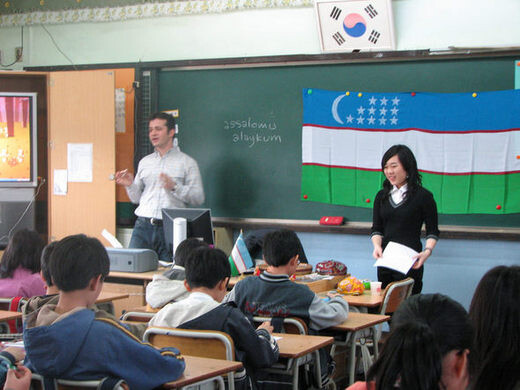hankyoreh
Links to other country sites 다른 나라 사이트 링크
Foreigners cite nationalism, discrimination as barriers to life in Korea

A 30-year-old foreign woman, who gained South Korean nationality last year after leaving her home in a central Asian country to marry a Korean, wept on April 20 as she talked to a Hankyoreh reporter. Her bloodshot eyes were mixed with anger and chagrin. Her anger centers on how her 10-year-old son is treated in school, where he is a third-grade elementary student. "Fourth and fifth grade students beat my son because he is different in appearance. Despite my appeals to the school, the matter hasn’t been resolved.” Because of the matter, she transferred her son to another school, but the situation did not change. "My son is scared of going to school," she sighed.
***
A 36-year-old Mongolian woman came to South Korea in 2003. Though she received Korean nationality last year, she has seen no difference in her poor treatment. While she received a Korean identification card instead of a foreigner’s one, and while her appearance is similar to that of Koreans, these do not help her. "When I go to a restaurant or a store, people use polite expressions to greet me. But when they hear my pronunciation, they begin to talk impolitely to me." She plans to change her name to a Korean one because her five-year-old son would otherwise be discriminated against at elementary school, which he begins next year. Even in kindergarten, students ask the teacher whether her son, Min-su (not his real name), is Korean or not.
***
Given this atmosphere, how would South Korean society react if an immigrant commited a crime similar to the Virginia Tech massacre?
In the wake of the tragedy caused by a South Korean immigrant, some critics pointed out that South Koreans should reflect upon their attitude toward foreign immigrants such as Southeast Asian workers and others. In particular, as some foreigners who have gained South Korean nationality still suffer from widespread discrimination and prejudice, racism in South Korean society is under close scrutiny.
The central Asian woman said, "While the U.S. is a multiracial society, discrimination and prejudice are much more rampant in South Korea because Koreans think of themselves as a homogeneous people." The Mongolian woman said, "When I talk with my Mongolian friend on the subway, I am surprised by the coldness seen in the reactions of Koreans around us." She said her Filippino friends were told by other Koreans they were being noisy when they talked in their mother language.
Lee Cheol-seung, head of a foreign labor consultancy in South Gyeongsang Province, said, "Typically, Koreans treat immigrants as expatriates because they aren’t ethnic Koreans. If one were to commit a crime similar to that of Seung-hui Cho, ethnic Koreans would consider him as a non-Korean, as still being a member of the society from which he initially came," Lee said.
Kim Yun-jae, a lawyer who emigrated to the U.S., said, "Most Koreans see the [Virginia Tech] tragedy as a cause for shame and guilt, instead of considering it an incident caused by structural problems in American society. In light of this attitude, most Koreans are likely to treat immigrants and naturalized Koreans in the same way [they treated the Cho incident]," he added.
Kang Seong-hye, head of an emergency call center for immigrant women, said, "To resolve the matter of Koreans’ nationalistic exclusivity, we should figure out ways to reshape the community, and teach this in schools in order to share it with society. Services are also needed to help immigrants adapt to being Korean," Kang said.
Please direct questions or comments to [englishhani@hani.co.kr]
Editorial・opinion
![[Column] Has Korea, too, crossed the Rubicon on China? [Column] Has Korea, too, crossed the Rubicon on China?](https://flexible.img.hani.co.kr/flexible/normal/500/300/imgdb/original/2024/0419/9317135153409185.jpg) [Column] Has Korea, too, crossed the Rubicon on China?
[Column] Has Korea, too, crossed the Rubicon on China?![[Correspondent’s column] In Japan’s alliance with US, echoes of its past alliances with UK [Correspondent’s column] In Japan’s alliance with US, echoes of its past alliances with UK](https://flexible.img.hani.co.kr/flexible/normal/500/300/imgdb/original/2024/0419/2317135166563519.jpg) [Correspondent’s column] In Japan’s alliance with US, echoes of its past alliances with UK
[Correspondent’s column] In Japan’s alliance with US, echoes of its past alliances with UK- [Editorial] Does Yoon think the Korean public is wrong?
- [Editorial] As it bolsters its alliance with US, Japan must be accountable for past
- [Guest essay] Amending the Constitution is Yoon’s key to leaving office in public’s good graces
- [Editorial] 10 years on, lessons of Sewol tragedy must never be forgotten
- [Column] A death blow to Korea’s prosecutor politics
- [Correspondent’s column] The US and the end of Japanese pacifism
- [Guest essay] How Korea turned its trainee doctors into monsters
- [Guest essay] As someone who helped forge Seoul-Moscow ties, their status today troubles me
Most viewed articles
- 1[Column] The clock is ticking for Korea’s first lady
- 2Samsung barricades office as unionized workers strike for better conditions
- 3After 2 months of delayed, denied medical care, Koreans worry worst may be yet to come
- 4[Correspondent’s column] In Japan’s alliance with US, echoes of its past alliances with UK
- 5[Column] Has Korea, too, crossed the Rubicon on China?
- 6Hong Se-hwa, voice for tolerance whose memoir of exile touched a chord, dies at 76
- 7[Editorial] When the choice is kids or career, Korea will never overcome birth rate woes
- 8Constitutional Court rules to disband left-wing Unified Progressive Party
- 9Nearly 1 in 5 N. Korean defectors say they regret coming to S. Korea
- 10‘Right direction’: After judgment day from voters, Yoon shrugs off calls for change